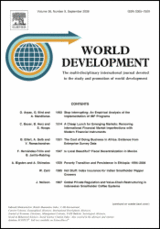Can gender-targeted employment interventions help enhance community participation? Evidence from urban Togo
Breuer, Anita / Edward Asiedu
External Publications
(2017)
published on World Development 11 April 2017
DOI: https://doi.org/10.1016/j.worlddev.2017.03.022
Information
The Participatory Development (PD) approach aims at improving the quality of governance by empowering local populations. Yet, PD projects are frequently fraught with undesired effects of elite capture which critics ascribe to insufficient appreciation of local context. We adopt a quantitative–qualitative mixed method approach to broaden the empirical foundation needed for context sensitive project design. By exploring the effects of gender and employment on community participation we contribute to narrowing two research gaps: First, political science research on female participation in SSA has mostly focused on participation in national-level processes. Second, while development economics literature has devoted attention on effects of female employment on intra-household bargaining, it has so far omitted the question what this means for the empowerment of women in the public life of their communities. Analyzing original survey data of over 1,300 respondents from urban Togo, we find that unemployment negatively impacts community participation. Specifically, we show that this effect is mainly driven by female unemployment and establish self-efficacy as the causal link between female employment and participation. Complementing our quantitative findings with data from 98 qualitative interviews, we show that employment constitutes an important psychological resource that enables women to overcome discrimination barriers to community participation. However, this effect is stronger for women in a formal employment situation than for those working in less formalized settings. We conclude that gender-targeted employment interventions can help to increase community participation. We recommend that such efforts should not fixate on the creation of female job opportunities but also seek to strengthen the role of female informal workers in local political processes.


